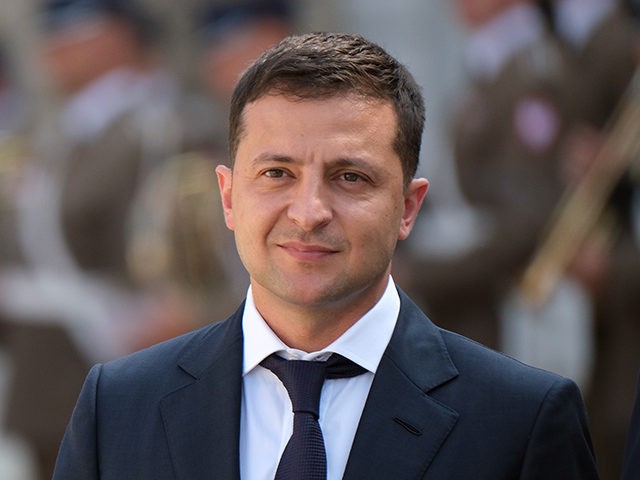A spokesperson for the presidency of Ukraine claimed Sunday that Kyiv had received the support of “over a dozen” countries in launching a plan to liberate Crimea, a Ukrainian region invaded and colonized by Russia in 2014.
President Volodymyr Zelensky signed a decree announcing a “strategy for de-occupation and reintegration” of Crimea on March 24 that spans a variety of topics, from military removal of the Russians to the promotion of Ukrainian national identity and humanitarian aid to those harmed by the 2014 invasion.
Russian leader Vladimir Putin claimed Crimea was largely populated by ethnic Russians and had historical ties to Moscow, necessitating a military occupation to “protect” the rights of locals. Russia held a “referendum,” largely condemned by Western free states for its illegitimate nature, in March 2014 in which the results overwhelmingly favored Russia annexing the region. The Ukrainian military is significantly smaller than Russia’s and has struggled for years with a civil war on its eastern border against local Russian separatists, which Ukraine accuses Moscow of supporting. Ukraine’s weakened security situation has made attempts at freeing Crimea impossible and cast doubt on Zelensky’s ability to single-handledly retake the peninsula.
Zelensky spokeswoman Yulia Mendel assured Dom TV, a network created by the Ukrainian government to reach occupied Crimea, that the president would not be going it alone in any attempt to liberate the region.
“The creation of the Crimean Platform has already been welcomed by such countries as Lithuania, Great Britain, Turkey, and many others — there are over a dozen [countries],” Mendel said. The spokeswoman added that, in the Zelensky administration’s estimation, “for some reason, Crimea was forgotten under the previous government, and the issue of getting the occupied peninsula back was not mentioned on any platform,” something Zelensky aspired to change.
“Now President Zelensky is talking with leaders of many countries about a new decision — about the Crimean Platform,” she added.
Russia’s invasion of Crimea occurred during the tenure of Oleksandr Turchynov, an interim president who spent less than a year in power after a turbulent period of anti-Russia protests led to the removal of Putin-friendly President Viktor Yanukovych. Petro Poroshenko, Zelensky’s predecessor, won the presidency on a staunchly anti-Russian campaign platform in which he promised to improve ties to Western Europe and the United States and restore the sovereign integrity of the country. Poroshenko faced several corruption scandals and failed to end the civil war in Donbass, eastern Ukraine, or return Crimea to Kyiv, granting Zelensky, a sitcom actor with no political experience, a landslide win in the 2019 presidential election.
Zelensky’s “Crimean Platform,” according to the Ukrainian news agency Unian, calls for an international coalition of heads of state to remove Russian government influence in the region. “An expert network will be created to enhance the effectiveness of government action, as well as engage additional intellectual resources in the platform’s work,” the outlet added.
Zelensky’s executive action demands an “action plan” for retaking Crimea from all of Ukraine’s government agencies, not just its armed forces and diplomats. It reportedly requires detailed “diplomatic, military, economic, informational, humanitarian and other measures” to fully expel the Russian government from the region. Moscow’s state-run Russia Today objected to the plan involving the pursuit of full NATO membership for Kyiv. NATO countries are obligated to all respond in the event of an attack on one member country, meaning any Russian military action against a NATO country would necessitate a response from much larger military powers than Ukraine, such as the United States.
While Mendel did not name all of the specific countries allegedly supporting Zelensky’s initiative, several countries have made generalized statements in support of the return of Crimean land to Ukraine’s control.
“We welcome in principle Ukraine’s initiative to establish an International Crimean Platform to consolidate the international community’s efforts on Crimea,” the foreign ministers of the G7 nations — Canada, France, Germany, Italy, Japan, the United Kingdom, and the United States — said in a joint statement in March. The statement preceded the detailed decree Zelensky published on the matter a week later. “Today, seven years after Russia’s illegitimate and illegal annexation of the Autonomous Republic of Crimea and the City of Sevastopol, we reaffirm our unwavering support for and commitment to the independence, sovereignty and territorial integrity of Ukraine within its internationally recognised borders.”
The Zelensky administration has vocally urged the United States, in particular, to take a more prominent role in helping it restore its territorial integrity, which may prove a challenge under President Joe Biden. Biden’s former boss Barack Obama was president when Russia colonized Crimea and did not take any meaningful action against the move. Biden himself spoke to Zelensky for the first time since becoming president last week, prioritizing the heads of state of nations such as Chile, South Africa, and New Zealand over Ukraine.
Biden reportedly offered Zelensky “unwavering support for Ukraine’s sovereignty and territorial integrity in the face of Russia’s ongoing aggression in the Donbas and Crimea,” according to the White House.
“We are still waiting for the U.S. administration’s specific and correct steps,” an apparently frustrated Foreign Minister Dmytro Kuleba said in remarks last week, according to the Kyiv Post. “One of Ukraine’s key expectations … is a more active and, what’s important, urgent American involvement in the de-occupation of the (Donbas) and Crimea.”
Kuleba’s remarks notably occurred before Biden had spoken to Zelensky, and he did claim he believed Biden would take a “clear stance” against Russia.

COMMENTS
Please let us know if you're having issues with commenting.